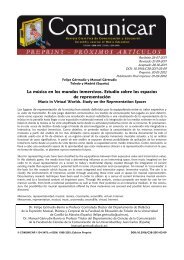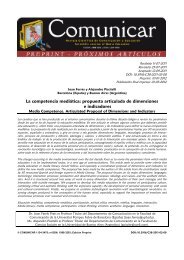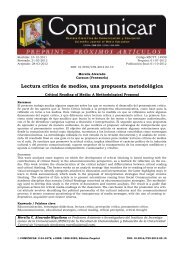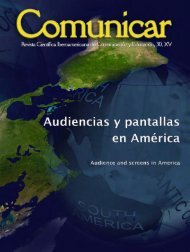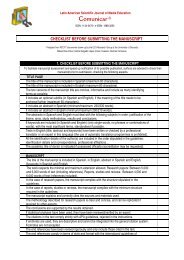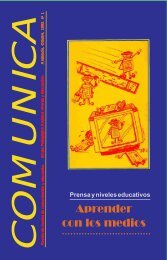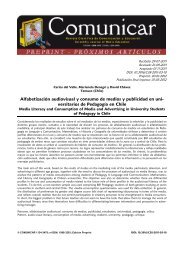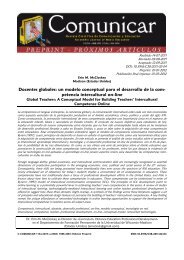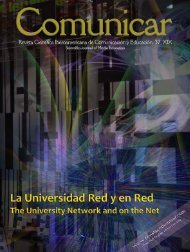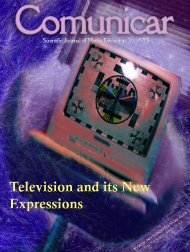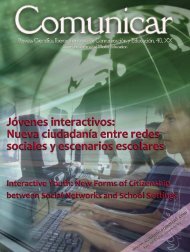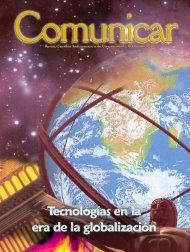Comunicar 39-ingles - Revista Comunicar
Comunicar 39-ingles - Revista Comunicar
Comunicar 39-ingles - Revista Comunicar
You also want an ePaper? Increase the reach of your titles
YUMPU automatically turns print PDFs into web optimized ePapers that Google loves.
D O S S I E Rl Susan Moeller, Elia Powers & Jessica RobertsCollege Park, Maryland (USA)Received: 08-02-2012 / Reviewed: 22-03-2012Accepted: 27-03-2012 / Published: 01-10-2012DOI: 10.<strong>39</strong>16/C<strong>39</strong>-2012-02-04«The World Unplugged» and «24 Hourswithout Media»: Media Literacy toDevelop Self-Awareness Regarding Media«El mundo desconectado» y «24 horas sin medios»: alfabetización mediática parala conciencia crítica de los jóvenesABSTRACTAcross the globe, many students have easy and constant access to media, yet they often receive little or no instructionabout the impact of their media consumption. This article outlines a «24 hours without media» exercise in accordancewith the guidelines set in Module 7, Unit 1 of the UNESCO curriculum. In the fall of 2010, nearly 1,000students from a dozen universities across five continents took part in «The World Unplugged» study. Researchersat the University of Maryland gathered students’ narrative responses to the going without media assignment andanalyzed them by using grounded theory and analytic abduction, assisted by IBM’s ManyEyes computer analysis software.Results showed that going without media made students dramatically more cognizant of their own mediahabits –with many self-reporting an «addiction» to media– a finding further supported by a clear majority in everycountry admitting outright failure of their efforts to go unplugged. Students also reported that having constant accessto digital technology is integral to their personal identities; it is essential to the way they construct and manage theirwork and social lives. «The World Unplugged» exercise enabled experiential learning; students gained increasedself-awareness about the role of media in their lives and faculty came to better understand the Internet usage patternsof their students, enhancing their ability to help young people become more media literate.RESUMENLa mayoría de los jóvenes del mundo se conecta habitualmente a los medios de comunicación; sin embargo, enpocas ocasiones reciben formación respecto a los impactos que este consumo mediático tiene en ellos mismos. Esteartículo expone la experiencia llevada a cabo en el marco del Currículum UNESCO, denominada «24 horas sinmedios». En otoño de 2010, cerca de 1.000 estudiantes de 12 universidades de cuatro continentes participaron enel estudio «El mundo desconectado». Investigadores de la Universidad de Maryland (Estados Unidos) recogieronrigurosamente las reflexiones de los alumnos que participaron y las analizaron a través del programa estadístico IBM’sManyEyes. Los resultados muestran que los jóvenes, a raíz del ejercicio, fueron más conscientes de sus hábitosmediáticos, y muchos de ellos indagaron sobre su propia «adicción» a los medios, mientras que otros no consiguieronsiquiera concluir estas 24 horas sin medios. También se pone en evidencia que el acceso cotidiano a la tecnologíadigital forma parte ya de su identidad juvenil y son básicas para entender su forma de trabajar y sus relaciones sociales.También se demuestra que los alumnos aumentaron su autoconciencia sobre el papel de los medios en sus vidas,y el profesorado comenzó a comprender mejor los intereses de sus alumnos, así como sus parámetros de consumode Internet, mejorando sus habilidades para ayudar a los jóvenes a estar más alfabetizados mediáticamente.KEYWORDS / PALABRAS CLAVEMedia literacy, media education, media awareness, Internet, media addiction, digital technology, mobile technology.Alfabetización mediática, conciencia mediática, Internet, adicción mediática, tecnología digital, tecnología móvil.v Dr. Susan D. Moeller is Director of the International Center for Media & the Public Agenda, and Professor at thePhilip Merrill College of Journalism & School of Public Policy, University of Maryland, MD (USA) (icmpa@umd.edu).v Elia Powers is Ph.D. student in the Philip Merrill College of Journalism, University of Maryland,College Park, MD (USA) (epowers1@umd.edu).v Jessica Roberts is Ph.D. candidate in the Philip Merrill College of Journalism, University of Maryland,College Park, MD (USA) (jessyrob@umd.edu).<strong>Comunicar</strong>, n. <strong>39</strong>, v. XX, 2012, Scientific Journal of Media Education; ISSN: 1134-3478; pages 45-52www.comunicarjournal.com



